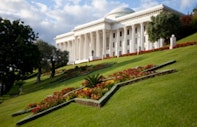What Bahá’ís Believe
Bahá’u’lláh and His Covenant
The Universal House of Justice
A Unique Institution
- What Bahá’ís Believe
- Overview
- Bahá’u’lláh and His Covenant
- The Life of the Spirit
- God and His Creation
- Essential Relationships
- Universal Peace
- What Bahá’ís Do
The Universal House of Justice is unique in religious history. Never before has a Manifestation of God explicitly ordained the establishment of an institution with the mandate to maintain the integrity and flexibility of His religion, safeguard the unity and guide the activities of His followers, and exert a beneficial influence on the life of society.
By virtue of the authority invested in it by Bahá’u’lláh, the Universal House of Justice sits as the head of an administrative order whose features, authority and mode of functioning are clearly enunciated in the Sacred Writings. The work of the institutions of this administrative order is characterized by an ethos of loving service, focused as it is on the development of human potential and the advancement of civilization.
Powers and Duties
The members of the Universal House of Justice, April 1963.
The elected members of the Universal House of Justice are described in the Bahá’í Sacred Writings as the “Trustees of God among His servants and the daysprings of authority in His countries”,Tablets of Bahá’u’lláh Revealed After the Kitáb-i-Aqdas, Ishráqát as the “Men of Justice”,Bahá’u’lláh, The Kitáb-i-Aqdas the “Deputies of God”,Bahá’u’lláh, The Kitáb-i-Aqdas the “Trustees of the All-Merciful.”Bahá’u’lláh, The Kitáb-i-Aqdas They must be “shepherds unto His sheep”,Bahá’u’lláh, The Kitáb-i-Aqdas protecting and preserving the unity and well-being of Bahá’u’lláh’s followers, as well as “manifestations of the fear of God and daysprings of knowledge and understanding”,The Will and Testament of ‘Abdu’l-Bahá “steadfast in God’s faith and the well-wishers of all mankind.”The Will and Testament of ‘Abdu’l-Bahá
The Universal House of Justice is charged with the affairs of the people. It must apply the Bahá’í teachings to “the training of peoples, the upbuilding of nations, the protection of man and the safeguarding of his honor.”Tablets of Bahá’u’lláh, Ishráqát It must have the utmost regard for the interests of the people at all times and under all conditions, and ensure the protection and safeguarding of men, women and children.
The promotion of peace in the world is also among the responsibilities of the Universal House of Justice, “so that the people of the earth may be relieved from the burden of exorbitant expenditures.”Tablets of Bahá’u’lláh, Lawh-i-Dunyá Its members must additionally “endeavor to the utmost of their power to safeguard”Tablets of Bahá’u’lláh, Ishráqát the position of religion, “promote its interests” and “exalt its station in the eyes of the world.”Tablets of Bahá’u’lláh, Ishráqát
Since “change is a necessary quality and an essential attribute of this world, and of time and place”,‘Abdu’l-Bahá, cited in a message of the Universal House of Justice, To an individual, 27 May 1966 Bahá’u’lláh has invested the members of the Universal House of Justice with the authority to consider matters that He did not specifically deal with in His own Writings and “enforce that which is agreeable to them.”Tablets of Bahá’u’lláh, Kalimát-i-Firdawsíyyih
“Inasmuch as for each day there is a new problem and for every problem an expedient solution,”Tablets of Bahá’u’lláh, Ishráqát wrote Bahá’u’lláh, “such affairs should be referred to the Ministers of the House of Justice that they may act according to the needs and requirements of the time.”Tablets of Bahá’u’lláh, Bishárát
The Bahá’í Sacred Writings give the guarantee that the Universal House of Justice will take decisions and establish laws through the “inspiration and confirmation of the Holy Spirit”.‘Abdu’l-Bahá, cited in a message of the Universal House of Justice, To an individual, 27 May 1966 For Bahá’ís, “obedience to its decisions is a bounden and essential duty and an absolute obligation”.‘Abdu’l-Bahá, cited in a message of the Universal House of Justice, To an individual, 27 May 1966
Origins
The institution of the Universal House of Justice was ordained by Bahá’u’lláh in His Most Holy Book, the Kitáb-i-Aqdas. Its responsibilities were also expanded upon in a number of His other Writings. ‘Abdu’l-Bahá confirmed the authority of the Universal House of Justice in His Will and Testament and provided specific details regarding its establishment and functioning.
In the early years of the 20th century, during a period when His life was in particular danger, ‘Abdu’l-Bahá took measures to arrange for the election of the Universal House of Justice should something happen to Him. This precaution did not turn out to be necessary.
After ‘Abdu’l-Bahá’s passing, Shoghi Effendi—the Guardian of the Bahá’í Faith—placed the greatest importance on the establishment of the Universal House of Justice. He devoted more than three decades to preparing the Bahá’í world community for its election, repeatedly looking ahead to that auspicious occasion in glowing terms. It was first necessary, however, to raise up and strengthen the global network of Local and National Bahá’í Assemblies to provide a strong basis for such an entity. Every new National Spiritual Assembly that was formed became one more pillar to “share in sustaining the weight and in broadening the foundation of the Universal House of Justice.”Shoghi Effendi, Messages to the Bahá’í World, p. 153
In 1951, Shoghi Effendi appointed a number of individuals to an International Bahá’í Council, a forerunner to the Universal House of Justice. In 1961, this appointed Council was reformed as a body elected by all the National and Regional Assemblies then established in the world.
After Shoghi Effendi’s sudden passing in 1957, his work was faithfully carried on by the group of distinguished Bahá’ís he had appointed as Hands of the Cause of God. These individuals arranged for the first election of the Universal House of Justice.
In April 1963—the centenary of the public declaration of Bahá’u’lláh—the Universal House of Justice was elected by all 56 National Spiritual Assemblies that were by then established in the world. The International Bahá’í Council ceased to exist with the election of the Universal House of Justice.
The coming into being of the Universal House of Justice was a tremendously significant event. After more than a century of expansion and consolidation—and through a democratic global electoral process—the Bahá’ís of the world were able to bring into existence the permanent international institution, ordained by Bahá’u’lláh, to guide its affairs.
Since its formation, the Universal House of Justice has devoted more than half a century to building and consolidating a Bahá’í community which has the resources and capabilities to participate in the establishment of the global civilization envisaged by Bahá’u’lláh, through a process of applying His teachings to the betterment of the world.
To support it in its work, the Universal House of Justice has, furthermore, created a number of appointed institutions; among these are the Continental Boards of Counsellors and the International Teaching Centre.
As stipulated by Bahá’u’lláh, the Seat of the Universal House of Justice is located on Mount Carmel in the Holy Land, in close proximity to the Shrine of the Báb.
Electoral Process
The Universal House of Justice is elected through a three-stage process.
In every national Bahá’í community, all adult Bahá’ís in good standing, 18 years of age or older, are eligible to take part in elections at the grassroots level—known as unit conventions—held once a year throughout their country. At these conventions, the Bahá’ís vote by secret ballot for delegates who are duly responsible to elect the nine persons to serve on the National Spiritual Assembly for the term of one administrative year. The National Spiritual Assembly is then elected at the National Convention.
A delegate from Bolivia casts his ballot for the Universal House of Justice, April 2008.
The members of all National Spiritual Assemblies elect, in turn, the nine members to serve on the Universal House of Justice. The election of the Universal House of Justice is conducted once every five years at the International Bahá’í Convention. Of several days’ duration, the Convention is held at the World Centre of the Bahá’í Faith in Haifa, Israel, where the members of the National Spiritual Assemblies are able to visit the Holy Shrines in preparation for the duty they are called upon to discharge. Foremost in their minds as they cast their ballots are passages from the Bahá’í Writings which describe those whom they choose to serve on such an august body as “daysprings of knowledge and understanding”, “steadfast in God’s faith”, and the “well-wishers of all mankind”.The Will and Testament of `Abdu’l-Bahá In common with the procedure of electing all Bahá’í institutions, the election of the Universal House of Justice is devoid of any system of nomination, electioneering, canvassing or propaganda.
The membership of the Universal House of Justice is confined to men. While this may be surprising, it is a provision that was ordained by Bahá’u’lláh Himself. ‘Abdu’l-Bahá has stated that its wisdom will be clearly understood in the future. Because the Bahá’í Writings are filled with unequivocal statements about the equality of men and women, however, the question of male membership of the Universal House of Justice can in no way be regarded as a sign of the superiority of men over women. ‘Abdu’l-Bahá writes that the equality of men and women is an “established fact.”‘Abdu’l-Bahá, The Promulgation of Universal Peace The Universal House of Justice is fully committed to advancing this principle—in its guidance to Bahá’í communities worldwide, through the resources allocated to the development and education of women and girl children in particular, through statements presented by the Bahá’í International Community at the United Nations, and by Bahá’í participation in conferences, seminars and other arenas.







